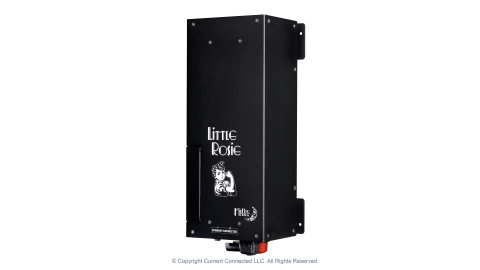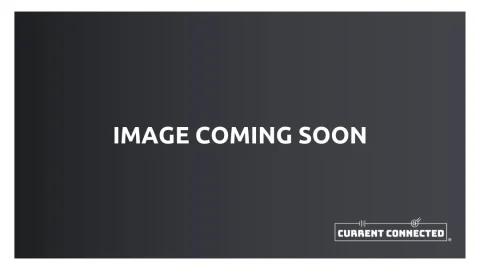Inverter
On-grid and off-grid home inverters convert power from DC (Direct Current) to AC (Alternating Current). DC power comes from power generators such as solar, wind, and hydro. It also comes from batteries storing power. The electrical grid and most appliances use AC power, meaning an alternative energy system, such as a solar system, requires an inverter to convert the generated power.
There are several different kinds of inverters. Inverter-chargers use batteries to power loads and use incoming AC power to charge batteries. All-in-one inverters are similar to inverter-chargers, but they include a solar charge controller which manages and converts incoming power from solar panels. Hybrid inverters can both receive and export AC power. This is useful in systems that sell power back to the electrical grid. They also charge batteries like inverter-chargers. Off-grid inverters cannot export AC power. While called off-grid, they can be used on-grid. They can take in AC power, but they cannot sell it to the utility company.
The above inverters usually oversee an entire energy system, but microinverters are another option. These small inverters attach directly to solar panels and convert the harvested DC power to AC power at the module level. Some of these inverters, like the Aptos MAC-400 (1:1 Trunk Version) Microinverter, also monitor and optimize the solar production of each individual panel.
Most microinverters require an AC connection to function. They match the harvested DC power to the connected AC power, and if AC power is not present, they cannot convert the DC power. This makes them ideal for use in grid-tied systems with few power outages.
Current Connected sells solar grid-tied and off-grid home inverters for a variety of applications. The options below include inverters for RVs, boats, cabins, residential homes, commercial settings, fully off-grid systems, and grid-tied systems.
Check them out and contact us with any questions. We look forward to helping you with your energy needs.
Showing 1–24 of 31 results
-

MidNite Solar Little Rosie 4548RE 48Vdc 4500W 120Vac Inverter, 60A Charger, AC Support, Inverter for Residential Backup, UL 1741, Made in USA
$1,349.00 Add to cart -

Residential 10kVA 120/240V Off-Grid Power System Kit
From: Original price was: $7,164.87.$7,175.07Current price is: $7,175.07. Select options -

EG4 FlexBOSS18 48V Hybrid All-In-One Inverter, 10kW AC Output, 18kW Solar Input, NEMA 4X, UL 1741 & UL 9540
$3,499.00 Add to cart -

MidNite Solar Little Rosie 3648M 48Vdc 3600W 120Vac Inverter, 60A Charger, Neutral-Ground-Bonding Relay Inverter for Mobile, UL 458 & UL 1741
$1,617.38 Add to cart -

EG4 12000XP 48V Split Phase Off-Grid Inverter, 12kW AC Output, 24kW Utilized Solar Input, UL 1741 & UL 9540 Solar Inverter
$2,589.29 Add to cart -

EG4 FlexBOSS21 48V Hybrid All-in-One Inverter, 12kW-16kW AC Output, UL 1741 & UL 9540 Solar Inverter
$4,199.00 Add to cart -

Victron Energy MultiPlus-II 24V 3kVA 120V AC Output Inverter, 70A Battery Charger, UL 458 Mobile Inverter
$997.05 Add to cart -

EG4 12kPV 48V 8kW Hybrid All-in-One Inverter, 12kW Solar Input, NEMA 4X, UL 1741 & UL 9540 Solar Inverter
$3,499.00 Add to cart -

Industrial 20kVA 120/240V Off-Grid Power System Kit
From: Original price was: $10,534.09.$10,544.29Current price is: $10,544.29. Select options -

EG4 18kPV 48V All-in-One Hybrid Inverter, 12kW AC Output, 18kW PV Input, UL 1741 & UL 9540 Solar Inverter
$4,898.00 Select options This product has multiple variants. The options may be chosen on the product page -

Victron Energy MultiPlus 12V 2kVA 120V AC Output Inverter, 80A Battery Charger, Mobile Inverter
$861.90 Add to cart -
1

MNP 48V 11.4kW AC Output Hybrid All-in-One Inverter, UL 1741 Solar Inverter, Battery Charger & Automatic Smart Transfer Switch
$5,649.99 Add to cart -

[Discontinued] Victron 12V MultiPlus-II 3kVA 120V Inverter – 120A Charger
Read more -

Victron Energy MultiPlus-II 12V 3kVA 120V AC Output Inverter, 120A Battery Charger, UL 458 & UL 1741 Inverter
$1,006.40 Add to cart -

[Discontinued] Victron 12V MultiPlus-II 3kVA 2x120V Inverter/Charger
Read more -

Victron Energy MultiPlus-II 12V 3kVA 2x120V Inverter 120A Battery Charger, 120/240V Passthrough, UL 458 Inverter
$1,088.00 Add to cart -

Victron Energy Phoenix 12V 1.2kVA 120V Inverter, UL 458, NEMA 5-15R Receptacle
$293.25 Add to cart -

[Discontinued] Victron 24V MultiPlus-II 3kVA 120V Inverter 70A Charger
Read more -

[Discontinued] Victron 24V MultiPlus-II 3kVA 2x120V Inverter 70A Charger
Read more -

Victron Energy MultiPlus-II 24V 3kVA 2x120V Inverter 70A Battery Charger, 120/240V Passthrough, UL 458 Inverter for Mobile Energy Systems
$1,145.80 Add to cart -

Victron Energy MultiPlus 48V 2kVA Inverter 25A Charger, True Sine Wave Inverter
$889.95 Add to cart -

Victron Energy MultiPlus-II 48V 3kVA 120V AC Output, 35A Battery Charger, UL 1741 Residential Low Frequency Inverter-Charger
$1,168.75 Add to cart -

[Discontinued] Victron 48V MultiPlus-II 3kVA 120V Inverter 35A Charger
Read more -

Victron Energy MultiPlus-II 48V 5kVA 120V AC Output, 70A Battery Charger, Low Frequency Inverter-Charger
$1,458.60 Add to cart
